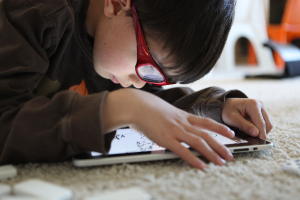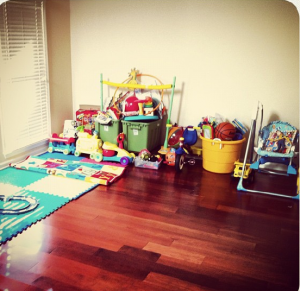(Image credit: http://farm5.staticflickr.com/4069/4488285832_674780efe2_o.jpg)
All mothers want their kids to be tidy, neat, and productive. But it’s a constant struggle to get them to listen to you. Making them cultivate good habits seems like a gargantuan task. If your kids are naturally obedient and tidy, you’re one lucky mother!
But more often than not, kids are carefree creatures who have no regard for their surroundings or for whether they brushed their teeth or not. It then falls on you as a mother to show them the importance of discipline and cleanliness. In this post we look at how you can help your kids pick up good habits that will aid their productivity as they grow up.
Set Strict Routines
We are all creatures of habit. And the best way to make a habit come into being is to spend your days along a set routine. Kids are like blank slates or wet clay. They can be molded the way you want them to, but for that you will have to take responsibility for introducing supportive routines to help them cultivate the habits that you think will be good for them.
This includes set times for going to bed and waking up, for breakfast and shower, for play, exercise, TV viewing, homework, dinner, and then back to bed.
Introduce as many grooming habits as you want– cutting nails, polishing their shoes, brushing teeth before going to bed — within this tight framework of a solid routine.
You will have to be very patient and persistent to make a good routine the backbone of your children’s lives. Each time you want to introduce a new habit into the mix, tweak the routine slightly to make way for it. But only introduce one new practice at a time. Keep it easy for your children.
Spend a Day Organizing with Your Children
(Image credit: http://farm9.staticflickr.com/8055/8136188450_904fa32b93_z.jpg)
Routines are not always enough, and they certainly do not override the tendencies of children to slip. Kids are kids and they will make a mess from time to time.
If you want them to be more responsible towards their surroundings, beginning with their own room, you will have to make the process fun for them.
Designate one or two days each month for you to spend tidying up your home and organizing things with your children.
How often you do this depends on how feasible it is for you and your own work commitments. But I’m a huge believer in doing those things together which you want your children to remember.
Pick up a room and focus on giving it a makeover or simply (re)organizing it from the ground up. Tidy up the kids’ wardrobes (Onlyhangers.com has great hanger ideas for children), arrange their toys in the toy hampers, sort out their stationery, school books, drawing books, and crayons, with their help.
This will achieve the following:
- You will show them how it is done. Repeatedly. Repetition reinforces the message, and is the best way to get your kids to learn new habits and ways.
- You will make it fun. Put on their favorite music in the background and turn the organizational day or evening into a memorable event.
- Solicit their ideas for doing their room. This will make them feel valued. You don’t have to implement those ideas if really outrageous (though they will make for great laughs all around) but I wouldn’t be averse to implementing a few of the kiddo ideas if they do not require drastic or highly impractical changes to be made to their room. It is, after all, their room. Let them have fun with it!
When the weather improves, venture into the garden with your kids and make them take an interest in the flora around them. Gardening can be great fun with children around you. They will also pick up a lot of things just following you around. Your little devils can be of a lot of help around the house if you know how to steer them in the right direction.
Tap into the Power of Lists
Lists are the essence of productivity for many of us. Master lists, calendars, and to-do apps impart a dose of sanity to stressed-out and ruffled mothers.
The very sight of a neatly laid out list of priorities can give us the anchor we need to get through our days. And that is why you should have more of them in your life and not only for yourself.
Find, or create, the most eye-catching lists and calendars you can find and hang them in your children’s bedroom or in any place where your kids cannot miss them.
List on them everything you want your children to accomplish on any given day or week. This will turn out to be very useful not just in reinforcing routines but also in cultivating new habits by serving constant reminders.
Don’t Give in to Tantrums
(Image credit: http://pixabay.com/static/uploads/photo/2013/11/22/17/25/baby-215867_640.jpg)
Parents often give into a screaming and kicking child because they just want it to get over with. The problem is, if you do that your child gets the wrong message.
This is something I picked up from an episode of the Dog Whisperer’s. Any behavior that you don’t want your pet to repeat, or you want it to wean off, ignore it firmly. In case of children, no matter how trenchant the pleadings get, do not give in to them. This is about control. You show them who’s the boss by not giving into their whims.
Conversely, don’t forget to reward good behavior, but don’t go over the top with your rewards or your kids will figure out where they have you at. Kids are a lot smarter than we give them the credit for.
Manage Your Own Negativity
“Don’t worry that your kids don’t listen to you. Worry that they are always watching you.” – Robert Fulghum
Children are like sponges. They absorb everything around them without discrimination. And children are most affected by those they spend most of their time with. Usually it’s the parents and classmates who fall into this category. Parents, therefore, can significantly affect their children’s worldview and personality, for better or worse.
If you want your kids to be smart, sorted, and positive, you will have to be all of that yourself first.
Never break down or throw a hissy fit in front of your kids. Don’t bitch about your spouse to your kids. Don’t gorge on junk and expect them to eat healthy. Stick to routines yourself for your words to have any impact on your children. In short, lead by example and the kids will gladly follow you!







